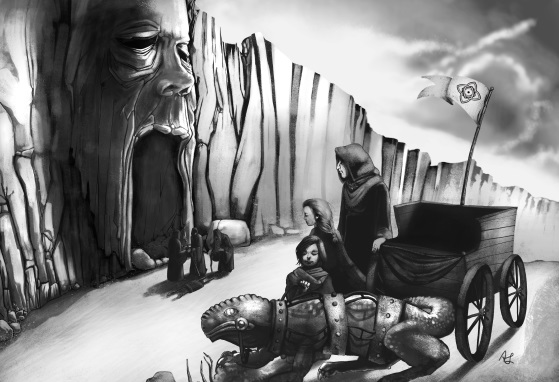Numenera is a game of exploration set in a world where anything can happen. Anything. Places and people are incredibly weird. Creatures more so. Which makes for a wonderful sense of awe and wonder.

But some players may worry, why should I care about anything in the Ninth World? It’s so damned weird, how can I relate to it?
Some games, like The Strange or Star Wars: Age of Rebellion, come with a set of built in ties to the world. The player characters are part of an organization (The Estate, The Rebellion) and what’s important to the organization becomes important to the characters. Other RPGs, like Call of or Cthulhu, Trail of Cthulhu, or Hunter: The Vigil come with built in sets of adversaries all characters are expected to take on. If you join a Call of Cthulhu game, you know you’re going to be investigating and struggling against the machinations of Elder Gods.
However, in most RPGs, including Numenera, PCs are likely to be freelance operators.
The GM has a few tools to help player characters care about the world. This time I’ll talk about how to make it personal. Next time we’ll discuss how let the players tell you what’s important, the reoccurring mastermind, and factions with faces. They are not mutually exclusive.
Make it personal. This is the key in any kind of story. You know the cliché from all those movie trailers, This time it’s personal? While you don’t have to say that in the deep movie trailer voice (oh, go ahead, your players will love it), you do want to make the stakes personal.
Survival is damned personal. For example, in MCG’s The Devil’s Spine, at least one player is put at risk. If the group doesn’t succeed in the adventure, the player character dies. Or in Beyond All Worlds, another from MCG, the entire party is trapped in a Ninth World Hell. Escape or die, it’s that simple.
Family is personal. Kidnap a character’s mother. Cripple or murder a younger sibling. These plot hooks, when not overused (“What? My mother’s kidnapped for the third time?”), are great for making the players care about the outcome.
An appeal to the character’s morals is personal. The Sun Below: City on the Edge, includes the player characters witnessing the kidnapping of two young children, and an appeal from their grandmother to rescue them. When a PC tells themselves "I may be an opportunistic bastard at times, but I'll be damned if I'm going to let these children suffer," they care.
When PCs have a personal stake, they know why they are taking action. They are not just tourists.
See Also:
- Making it Matter, Part II: Letting Your Players Tell You What’s Important and The Reoccurring Mastermind.
- Making it Matter, Part III: Factions

